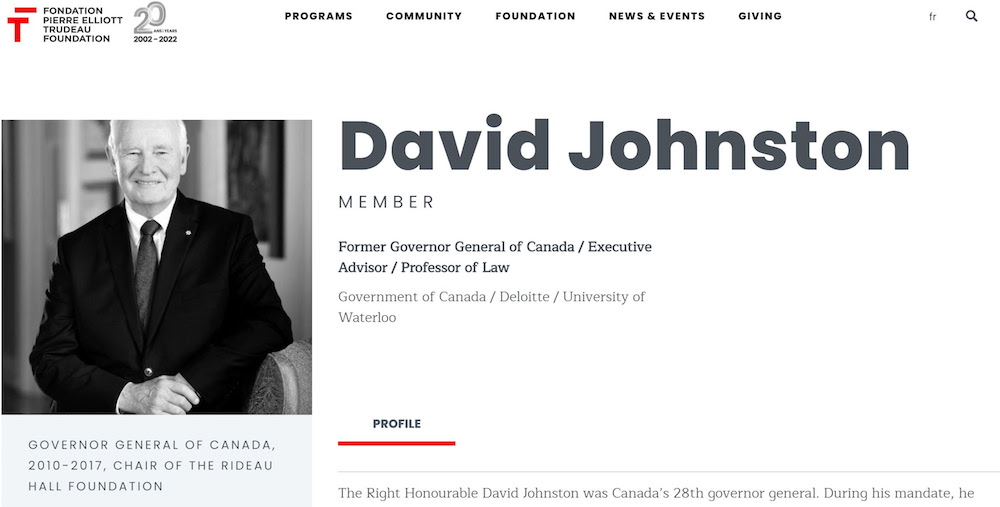National
Trudeau appoints a member of the Trudeau Foundation to investigate donations to the Trudeau Foundation – PPC leader Maxime Bernier

While opposition parties form positions on the Prime Minister’s appointment of former Governor General David Johnston as his Special Rapporteur, PPC Leader Maxime Bernier is expressing extreme outrage.
In this newsletter Bernier is using to both spread the news, and to raise money, Bernier points out just how closely tied the Trudeau family is to the former Governor General.
Another day, another example of Liberal corruption in Trudeau’s government.
To address increasing concerns around Chinese interference in our elections, Justin Trudeau said earlier this week that he would appoint a “special rapporteur”—whatever that means—to conduct an investigation.
Yesterday he announced he would be appointing former Governor General, David Johnston, to this position.
Trudeau is describing Johnston as a “Harper appointee” to try and make it seem like an impartial appointment when in reality it is anything but.
Johnston is a standing member of the Trudeau Foundation, the charity that accepted a $200,000 donation from the Chinese Communist Party laundered through a Chinese Canadian businessman.
Is this for real? Trudeau appoints a member of the Trudeau Foundation to investigate interference which involved donations to the Trudeau Foundation?!
It’s a clear conflict of interest!
To make things even more suspect, on multiple occasions, Trudeau has lovingly described Johnston as a “family friend,” having grown up alongside Johnston’s children.
Don’t believe me? Listen to Trudeau describe their relationship!
More recently, Johnston has been the Commissioner of the Leaders’ Debates Commission since it was established in 2018.
An organization whose mandate is to interfere with our elections!
As Commissioner, Johnston was responsible for trying to exclude dissident media organizations, like Rebel Media and True North, from covering the debates and holding the party leaders to account.
He was responsible for the absurd debate formats designed to protect the establishment narrative.
He was also responsible for wrongly excluding me from the debate stage during the 2021 election!
This was at the height of the covid craziness, when having me on national television would have completely destroyed the mainstream narrative.
This is the man who’s supposed to investigate interference in our election?
It’s absurd, but I can’t say I’m surprised. Canada under Trudeau has quickly become a corrupt banana republic.
We saw the exact same playbook with the Freedom Convoy Inquiry.
- Trudeau appoints a compromised individual to oversee things.
- They delay and push things back to allow public pressure to fall.
- Trudeau’s bought and paid for media runs cover for the establishment narrative.
- The commissioner/special rapporteur finds nothing is wrong and the conflict is swept under the rug.
This is absolutely unacceptable behaviour on Trudeau’s part! He continues to make a mockery of our democratic institutions.
The level of corruption and incompetence we’ve seen from this government is unprecedented.
Duane, we need to clean the house. We need to vote out every one of these corrupt, career politicians and fill the House of Commons with honest PPC MPs who will put the interests of Canadians first.
Help me accomplish this mission with a $10 donation today!
Thank you so much for your support,
-Max
P.S.: If you have trouble finding where you can donate, you can just click this link! https://www.
Health
23,000+ Canadians died waiting for health care in one year as Liberals pushed euthanasia

From LifeSiteNews
Tens of thousands of Canadians have died while on waitlists in recent years, according to new data. Meanwhile, euthanasia now accounts for five percent of all deaths in Canada.
Over 23,000 Canadians have died while on waitlists for medical care as Liberals focused on euthanasia expansions.
According to government figures published on November 26 by Canadian think tank SecondStreet.org, 23,746 patients died on government waiting lists for health care between April 2024 and March 2025.
“What’s really sad is that behind many of these figures are stories of patients suffering during their final years – grandparents who dealt with chronic pain while waiting for hip operations, people leaving children behind as they die waiting for heart operations, so much suffering,” SecondStreet.org President Colin Craig explained.
“It doesn’t have to be this way. If we copied better-performing European public health systems, we could greatly reduce patient suffering,” he continued.
According to the data, collected through Freedom of Information (FOI) requests, there has been a three percent increase of deaths while on waitlists compared to last year. The number is likely much higher, as the reports did not include figures from Alberta and some parts of Manitoba.
Data further revealed that 100,876 Canadians have died while waiting for care since 2018, thanks to increased wait times and insufficient staffing.
“It’s interesting that governments will regularly inspect restaurants and report publicly if there’s a minor problem such as a missing paper towel holder,” Craig noted. “Meanwhile, no government reports publicly on patients dying on waiting lists. It’s quite hypocritical.”
At the same time, the Liberal government has worked to expand euthanasia 13-fold since it was legalized, making it the fastest growing euthanasia program in the world. Meanwhile, Health Canada has released a series of studies on advance requests for assisted suicide.
As LifeSiteNews reported earlier this week, so-called “Medical Assistance in Dying” (MAID) is responsible for five percent of all deaths in Canada in 2024.
At the same time, internal documents from Ontario doctors in 2024 that revealed Canadians are choosing euthanasia because of poverty and loneliness, not as a result of an alleged terminal illness.
Currently, wait times to receive genuine health care in Canada have increased to an average of 27.7 weeks, leading some Canadians to despair and opt for assisted suicide instead of waiting for medical aid. At the same time, sick and elderly Canadians who have refused to end their lives have reported being called “selfish” by their providers.
In one case, an Ontario doctor revealed that a middle-aged worker, whose ankle and back injuries had left him unable to work, felt that the government’s insufficient support was “leaving (him) with no choice but to pursue” euthanasia.
Other cases included an obese woman who described herself as a “useless body taking up space,” which one doctor argued met the requirements for assisted suicide because obesity is “a medical condition which is indeed grievous and irremediable.”
The most recent reports show that euthanasia is the sixth highest cause of death in Canada. However, it was not listed as such in Statistics Canada’s top 10 leading causes of death from 2019 to 2022.
Business
Canada’s climate agenda hit business hard but barely cut emissions

This article supplied by Troy Media.
 By Gwyn Morgan
By Gwyn Morgan
Canada is paying a steep economic price for climate policies that have delivered little real environmental progress
In 2015, the newly elected Trudeau government signed the Paris Agreement. The following year saw the imposition of the Pan-Canadian Framework on Clean Growth and Climate Change, which included more than 50 measures aimed at “reducing carbon emissions and fostering clean technology solutions.” Key among them was economy-wide carbon “pricing,” Liberal-speak for taxes.
Other measures followed, culminating last December in the 2030 Emissions Reduction Plan, targeting emissions of 40 per cent below 2005 levels by 2030 and net-zero emissions by 2050. It included $9.1 billion for retrofitting structures, subsidizing zero-emission vehicles, building charging stations and subsidizing solar panels and windmills. It also mandated the phaseout of coal-fired power generation and proposed stringent emission standards for vehicles and buildings.
Other “green initiatives” included the “on-farm climate action fund,” a nationwide reforestation initiative to plant two billion trees, the “Green and Inclusive Community Buildings Program” to promote net-zero standards in new construction, and a “Green Municipal Fund” to support municipal decarbonization. That’s a staggering list of nation-impoverishing subsidies, taxes and restrictions.
Those climate measures come at a real cost to the industry that drives the nation’s economy.
The Trudeau government cancelled the Northern Gateway oil pipeline to the northwest coast, which had been approved by the Harper government, costing sponsors hundreds of millions of dollars in preconstruction expenditures. The political and regulatory morass the Liberals created eventually led to the cancellation of all but one of the 12 LNG export proposals.
Have all those taxes and regulatory measures reduced Canada’s fossil-fuel consumption? No. As Bjorn Lomborg has reported, between the election of the Trudeau government in 2015 through 2023, fossil fuels’ share of Canada’s energy supply increased from 75 to 77 per cent.
That dismal result wasn’t for lack of trying. The Fraser Institute has found that Ottawa and the four biggest provinces have either spent or forgone a mind-numbing $158 billion to create just 68,000 “clean” jobs, increasing the “green economy” by a minuscule 0.3 percentage points to 3.6 per cent of GDP at an eye-watering cost of more than $2.3 million per job.
That’s Canada’s emissions reduction debacle. What’s the global picture? A decade after Paris, 80 per cent of the world’s energy still comes from fossil fuels. World energy demand is up 150 per cent. Canada, which produces roughly 1.5 per cent of global emissions, cannot influence that trajectory. And, as Lomborg writes: “achieving net zero emissions by 2050 would require the removal of the equivalent of the combined emissions of China and the United States in each of the next five years. This puts us in the realm of science fiction.”
Does this mean our planet will become unlivable? A U.S. Department of Energy report issued in July is grounds for optimism. It finds that “claims of increased frequency or intensity of hurricanes, tornadoes, floods and droughts are not supported by U.S. historical data.” And it goes on: “CO2-induced warming appears to be less damaging economically than commonly believed and aggressive mitigation policies could be more detrimental than beneficial.”
U.S. Secretary of Energy Chris Wright responded to the report by saying: “Climate change is real … but it is not the greatest threat facing humanity … (I)mproving the human condition depends on access to reliable, affordable energy.”
That leaves no doubt as to where our largest trading partner stands on carbon emissions. But don’t expect Prime Minister Mark Carney, who helped launch the Glasgow Financial Alliance for Net Zero (GFANZ) at COP 26 in that city in 2021 and co-chaired it until this January, to soften his stand on carbon taxes. His just-released budget imposes carbon tax increases of $80 to $170 per ton by 2030 on our already struggling industries.
Doing so increases Canadian businesses’ competitive disadvantage with our most important trading partner while doing essentially nothing to help the environment.
Gwyn Morgan is a retired business leader who has been a director of five global corporations.
Troy Media empowers Canadian community news outlets by providing independent, insightful analysis and commentary. Our mission is to support local media in helping Canadians stay informed and engaged by delivering reliable content that strengthens community connections and deepens understanding across the country.
-

 Business2 days ago
Business2 days agoRecent price declines don’t solve Toronto’s housing affordability crisis
-

 Censorship Industrial Complex1 day ago
Censorship Industrial Complex1 day agoA Democracy That Can’t Take A Joke Won’t Tolerate Dissent
-

 Daily Caller2 days ago
Daily Caller2 days agoTech Mogul Gives $6 Billion To 25 Million Kids To Boost Trump Investment Accounts
-

 Business2 days ago
Business2 days agoOttawa’s gun ‘buyback’ program will cost billions—and for no good reason
-

 MAiD19 hours ago
MAiD19 hours agoFrom Exception to Routine. Why Canada’s State-Assisted Suicide Regime Demands a Human-Rights Review
-

 Business2 days ago
Business2 days agoCanada’s future prosperity runs through the northwest coast
-

 National2 days ago
National2 days agoCanada Needs an Alternative to Carney’s One Man Show
-

 Alberta2 days ago
Alberta2 days agoAlberta will defend law-abiding gun owners who defend themselves









